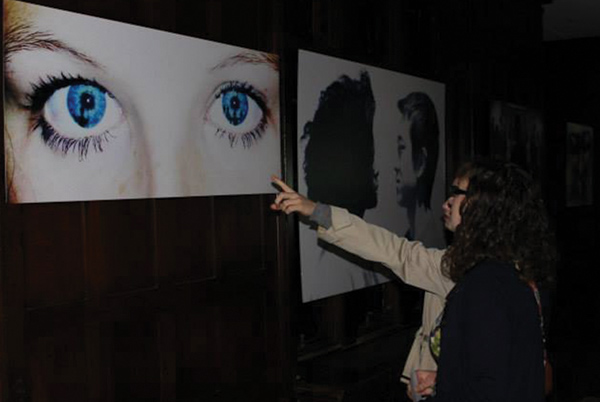Exhibit Exposes the Pain of the Hook-up Culture
By Eileen Scott, Senior Writer An art show at Princeton University helped to lift the veil of the hookup culture and expose the inner hurt it renders.
An art show at Princeton University helped to lift the veil of the hookup culture and expose the inner hurt it renders.On April 25, The Alternative, a student organization supported and resourced by Christian Union, hosted an art exhibit entitled Redress at the Campus Club in Princeton. The exhibit was intended to give a voice to the unspoken emotional and psychological damage of casual sex and encourage a lifestyle of sexual integrity. The term redress literally means "to restore, remedy, or relieve from suffering or want."
"Through the hookup culture, women and men alike are treated as means to pleasure rather than as individuals," said Mark Linnville (Princeton '13), a Christian Union ministry intern.
This kind of culture leaves young people questioning their worth and value.
"It is important to expose these harmful realities in order to encourage a [healthier] lifestyle," Linnville said.
Through a variety of mixed media works, including photographs, paintings, and spoken word, Redress was a powerful exhibit that put a spotlight on the consequences of hooking up. The featured artist was Liza Kuhn '13, whose photography reflected the inner pain of the commonly accepted culture of meaningless relationships.
"The Redress exhibit is an attempt to visualize the unseen, the unspoken and the untold realities of our generation's hook-up culture," stated Kuhn.
Monique Claiborne '17, the vice president of The Alternative, admitted that she was initially surprised by the idea of hosting the event.
"I do not think of art exhibits when imagining social events for college students," said Claiborne. "Nonetheless, I did think it was a great idea, especially when I learned that recent Princeton graduates would be the artists, and that current students would participate as well."
Additionally, Claiborne said Redress was an important event because many students do not feel there is a safe space to discuss the dark side of this campus culture. Redress provided that venue and also stirred emotions suppressed by those previously resigned to the prevailing attitude toward hooking up.
One photo series depicted a person peering out from behind the iris of an eye. In another, students lying in bed appear alone and unfulfilled, seemingly after a casual encounter. In each of the photos, the art resonated on a deeply emotional level.
"The photos made me feel trapped," said Claiborne. "I felt as if each photo evoked a feeling of isolation and loneliness that was heightened because the subject did not feel as if there were any other way to socialize." She went on to say that the works also made her feel "numb" due to the dispassionate expressions of the subjects. "The art made me feel the emptiness that the students feel from the hookup culture."
Nearly 500 students, faculty, and administrators attended the event, which also included spoken word performances. Coordinators made a conscious effort to invite the thought leaders and culture changers on campus, including eating club presidents, and university administrators and college deans. Eating clubs, where a majority of Princeton upperclassmen dine, are private, social organizations in close proximity to campus.
According to Linnville, The Alternative has received an overwhelming amount of thanks for hosting the event.
"This was based upon our ability to give visual confirmations that they are not alone in feeling the harms of the hookup culture," he said. The Alternative is also continuing to work with eating club presidents and deans of the college to keep moving forward with a culture change in this area.
However, Claiborne notes that the hookup culture seems to exist because of another unspoken emotion—the stress of academic life.
"The hookup culture at Princeton is so prevalent because students view it as a stress reliever, as a way to escape the pressures of academic success," she said. "Also, many students seek to cover their insecurities by seeking social success, which is unfortunately very much defined by sexual promiscuity."
Thus, continuing to lift the veils of insecurity, shame, and promiscuity—as they relate to the hookup culture—remains the mission of The Alternative. And the cultural brokenness is what it seeks to redress.
"We believe that the hookup culture is one of the root causes of the high growth of sexual assaults and that exposing the hookup culture will really give an opportunity to radically improve the health of all students on this campus," said Linnville. "If we can see the culture change here at Princeton, it can give us an opportunity to change the nation's culture as a whole."





